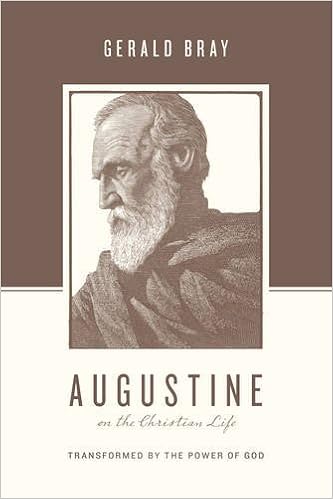
Augustine
on the Christian Life by Gerald Bray
For all that has been written on St. Augustine, from
Peter Brown’s excellent biography to the many monographs on his theology, few
have given much thought to how the saint from North Africa influences believers
in their Christian life. In steps Gerald
Bray, with his keen sense of vision for Christian history and the followers of
Christ who have made dramatic impacts.
Bray covers much ground in this book on Augustine, from his conversion
to his writings, especially his polemical and Trinitarian ones, with an eye at
every point to how this man of God helps us to follow Christ as well.
The loss of a close friend is a time of much pain
and soul-searching, such was the same for Augustine as he lost his good friend
Thagaste. Yet, it is in the response
after the death that muc introspection came for Augustine. Bray writes,
“The bitter experience of losing a close friend led
Augustine to meditate on the meaning and importance of love. Love lies at the
heart of Christianity and corresponds to the deepest yearnings of the human
heart. Everyone wants to love and be loved, but in human life all relationships
come to an end. Over time we lose those who are nearest and dearest to us—our
parents, our siblings, our friends, and even (as in Augustine’s own case) our
children. The only love that is constant is the love of God, and it is in his
love that all other loves acquire immortality (51).”
Although Augustine did not convert after this point
in his life, what he found in the ways of Manicheanism did not satisfy his needs
that only God could provide. This point
of loss, of searing pain, led Augustine one step closer to Christ.
Bray does an excellent job at helping the reader
understand Augustine’s concept that “outside the church there is no salvation.” He writes, “The reason for this is that it
was to the church that God had given the Scriptures and ensured that their
message would be proclaimed in fullness and purity throughout the world.
Schisms and heresies detracted from this mission, even if they preserved a
substantial element of the apostolic teaching. Faith in Christ came by the
hearing of the Word of God, and that was possible only in and through the
ministry of the church.8 This is why Augustine said that it was impossible for
anyone “to regard God as a merciful Father unless he is prepared to honor the
church as his mother (134).” Further,
with the lack of literacy among the common people, the church was where people
could hear the Bible, even if it was in Latin.
Part of Augustine’s remarks should be understood in light of his zealous
love for the local community of believers in an individual congregation. Augustine did believe that corruption
happened inside the church also, but he saw the sacraments and the Word of God
residing in the church.
With wisdom and grace, Gerald Bray gives us a book
on Augustine that is to be commended to all.
Thanks to Crossway for the copy of this book in
exchange for an honest review.
Comments
Post a Comment